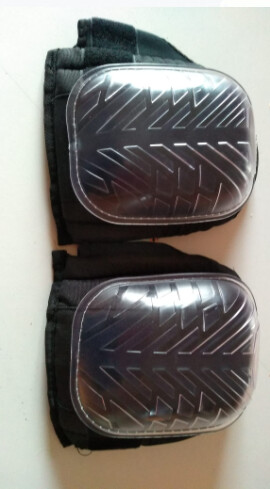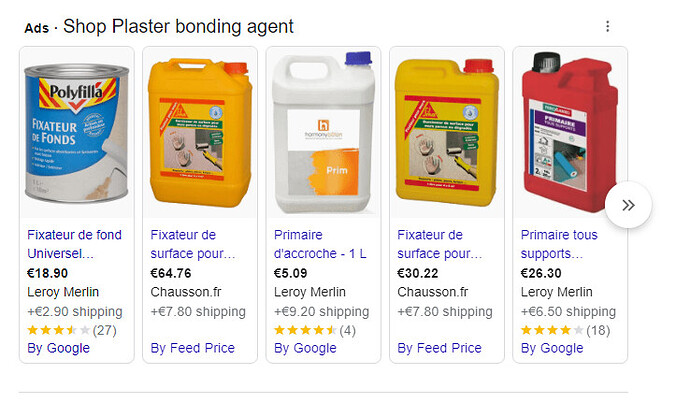Hello, Advice please. My UK plasterer has kindly agreed to plaster all the internal walls in my french house. The walls are dry and fairly good - he is going to just skim them all. He needs BOND IT PREGRIT . I am having great difficulty sourcing this product in France . – Is it called something else ? It is available on Amazon UK but cannot see it on Amazon FR !! Thought of shipping it over 6 tubs ( 10 Litre ) size - quote £1336 !!! To ship . Any Plasterers got ANY ideas please . Thanks in advance for recommendations or advice … Teresa Davies
"Febond Blue Grit agent de collage 5 L tout usage Primer " (???)
Perhaps if you scan the websites of shops like Leroy Merlin, BricoDepot etc etc…
You’ll find a suitable product.
Or visit the shops themselves and discuss with a Salesperson…
Other than that… can’t the UK plasterer bring it with him … ???
Is he doing this for free? If not, and he hasn’t got a permit that allows him to work here this is illegal under the table employment of a foreign worker. A serious thing here, especially post Brexit as also a reason to cancel your carte de séjour.
I know this may sound over-dramatic, and you no doubt know loads of people who have done similar things. And 99% of time no-one notices. But think about whether this is worth it?
Might he perhaps be driving over in his work van, filled with work tools? An obvious clue to the border force, your local authorities and neighbours who are perhaps nosey (or plasterers with not enough work).
Pre-Brexit British people had an automatic right to work here, now they don’t.
and anyway… what’s wrong with French artisans using French materials in a French house IN FRANCE ![]()
French plaster is not the same as in the UK and is more difficult to use which is why there aren’t that many plasterers here, you certainly won’t get the usual ‘smooth’ finish that us Brits are used to.
If the OP is adamant that the walls have to be plastered then I’d suggest they find a Brit plasterer who works here and will be used to the product.
What are the walls finished in at the moment, many in France are lime plastered, trying to put gypsum (UK) on the that is a bad marriage and would often result in separation.
Gypsum doesnt breath like lime plaster so you could have damp problems especially using blue grit surface sealer first, I wouldnt.
Well done, I was about to ask about what the walls are made of and how they’re finished at the moment…
I don’t entirely agree.
I used an English builder to plaster the walls of our new build - he used French materials and the effect achieved was perfection personified.
It might be more difficult, but a good English builder working in France worth his salt should be more than capable of achieving good results. The problem arises, in my experience, where poor quality “pretend” builders, not time served craftsmen, do a job on the cheap for cheapskate Brits dodging the payment of the going rate for quality work - and worse - working on the black ![]()
Yes, French plaster is very different than British plaster and to complicate matters more, there are a huge range of different plasters, all with different characteristics (fine, gritty, slow or rapid hardening). But even slow hardening plasters in France harden quickly. And “skim” plasters don’t exist in France to my knowledge.
In addition to all the reasons mentioned above to not bring a plasterer from the UK, you might find that a British plasterer has problems using French plaster. Perhaps you should consider using a French plasterer.
Thank you all for your valuable responses. We have now decided to just sand the walls as they are dry and in pretty good condition . This is an easier quicker resolution all round …
or, as mentioned, given the apparent dearth of French plasterers, a UK one with appropriate work permits and skills to match the materials being used.
Of course Graham, it’s not the nationality that counts, it’s the experience with French plaster!
Must say… from personal experience… getting plastered in France is good fun
(apologies, I’ve got a touch of the sun… 
 )
)
I apologise if this is “sucking eggs” advice but plaster dust is terrible stuff to breathe - make sure you wear a really good face mask suitable for fine dust/aerosol. Misting with water will help the dust settle on the floor rather than stay suspended in the air.
Make sure the current finish on the walls don’t contain asbestos as was a common ingredient up to 40 or so years ago.
sadly, not always the case… for many with poor French language skills, familiarity becomes the guiding principle. There are a number of good references of French building terms (in English) for guidance that can be found with just a bit of effort.
Which is awful because they end up getting doubly ripped-off by all these pseudo-qualified chancers. Doubly because the work isn’t up to scratch and the insurance won’t work.
Oh and of course there’s the occasional added bonus of a day in court and concomitant fine for illegally employing dodgy workers.
I am pretty confident in the bona fides of a Brit plumber I bumped into in the car park of Brico Marche, Vire. His card has a SIRET number on it. I suppose that could be faked but equally, I presume it can be checked. He was immediately up-front about his charges - €180/day. I don’t regard that as cowboy money.
I didn’t go out of my way to find a Brit plumber. He had ENG and FR sign-writing on his van, so I mooched over for a chat.
I used a FR sparks. I asked him if he could recommend a plumber. He hasn’t replied in over a month.
My FR is far better than my ES but for my flat in VLC , with the Screwfix catalogue as an ‘illustrated English dictionary’ of building mat’ls’, we got along fine. And they were superb.
Happy to use locals. Rather ![]() at FR prices. Installing laminate flooring - x3/x4 the rate in ES. I have bought a pair of monster knee pads - €6 from Lidl.
at FR prices. Installing laminate flooring - x3/x4 the rate in ES. I have bought a pair of monster knee pads - €6 from Lidl.

However, kneeling is one thing. Getting vertical again is another !
Siret number is a good sign. Dodgy people don’t bother to fake one as so easy to check whether number is real and who it belongs to - and for what! Always worth checking as people can say they’re a plasterer, but their Siret may say gardener so not officially recognised for anything else.
The guy’s van was comprehensively - and very neatly - fitted out with all the tools and bits a roving plumber needs. And - Ta Daaa! - he had had dealings with SF’s very own vehicle reg guru @anon90504988 for his RHD van!
I recommended he check SF out as a fount of all wisdom
